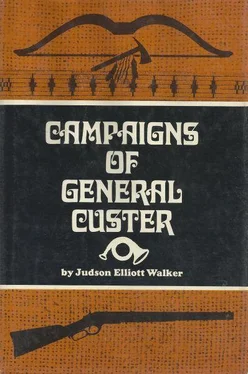Walker Array - Campaigns of General Custer in the North-west, and the final surrender of Sitting Bull
Здесь есть возможность читать онлайн «Walker Array - Campaigns of General Custer in the North-west, and the final surrender of Sitting Bull» весь текст электронной книги совершенно бесплатно (целиком полную версию без сокращений). В некоторых случаях можно слушать аудио, скачать через торрент в формате fb2 и присутствует краткое содержание. Жанр: Историческая проза, Исторические приключения, Приключения про индейцев, на английском языке. Описание произведения, (предисловие) а так же отзывы посетителей доступны на портале библиотеки ЛибКат.
- Название:Campaigns of General Custer in the North-west, and the final surrender of Sitting Bull
- Автор:
- Жанр:
- Год:неизвестен
- ISBN:нет данных
- Рейтинг книги:5 / 5. Голосов: 1
-
Избранное:Добавить в избранное
- Отзывы:
-
Ваша оценка:
- 100
- 1
- 2
- 3
- 4
- 5
Campaigns of General Custer in the North-west, and the final surrender of Sitting Bull: краткое содержание, описание и аннотация
Предлагаем к чтению аннотацию, описание, краткое содержание или предисловие (зависит от того, что написал сам автор книги «Campaigns of General Custer in the North-west, and the final surrender of Sitting Bull»). Если вы не нашли необходимую информацию о книге — напишите в комментариях, мы постараемся отыскать её.
Campaigns of General Custer in the North-west, and the final surrender of Sitting Bull — читать онлайн бесплатно полную книгу (весь текст) целиком
Ниже представлен текст книги, разбитый по страницам. Система сохранения места последней прочитанной страницы, позволяет с удобством читать онлайн бесплатно книгу «Campaigns of General Custer in the North-west, and the final surrender of Sitting Bull», без необходимости каждый раз заново искать на чём Вы остановились. Поставьте закладку, и сможете в любой момент перейти на страницу, на которой закончили чтение.
Интервал:
Закладка:
" You own this ground with me, and we must try and help ^ach other. I do not wish to leave here until I get all the people I left behind and the Uncapapas now at Poplar Creek. I would like to have my daughter, who is now at Fort Yates, sent up here to visit me, as also eight men now there (mentioning their names), and I would like to know that Louis Legare is to be rewarded for his services in bringing me and my people in here."
Sitting Bull and his people have been sent to the Indian
Agency of Standing Rock, Dakota, on the Missouri River, where Rain-in-the-Face, Gaul, Long-Dog and other chiefs of his tribe, with their followers, have preceded him.
At this agency there are now fully 7,000 Indians, and though "finis " may now be appended to the last chapter of the history of the Indian wars in the Northwest, yet, in dealing with these pent-up savages, soothing the malcontents, and restraining the unruly spirits there confined from deeds of violence, in helping and instructing those susceptible of civilizing influences, and benefiting and christianizing all, the Interior Department has a task as weighty, a labor as arduous, and a problem more puzzling, than that just worked out by the military, in their subjugation and capture.
CHAPTER II.
Officers in the Field against Sitting BuU since 1872.
The commanding officer of the Department of Dakota, Brevet-Major-General Alfred H. Terry, is one of the Brigadier-Generals in the regular army. He entered the volunteer service at the beginning of the late civil war, in 1861, as Colonel of the 2d Connecticut Volunteers. In 1862 he was promoted to a Brigadier-General, and in 1864 to a Major-General of Volunteers, and in 1835 he was made a Brigadier-General in the regular army. In accepting his commission he also received the following, which Congress, by joint resolution, passed as a vote of thanks to him and the officers under his command : " For the unsurpassed gallantry and skill exhibited by them in the attack upon Fort Fisher, and the brilliant and decisive victory by which that important work has been captured from the Rebel forces, and placed in the possession and under the authority of the United States, and for their long and faithful services and unswerving devotion to the cause of the country in the midst of its greatest difficulties and dangers." He was made a Brevet-Major-General in 1886, for gallant and meritorious services in the capture of Wilmington, North Carolina. He has been
in command of this military department since 1873, and the country has been fully advised at various times in regard to important operations against the hostiles. He needs no comment nor compliment from our pen.
Of the officers who have been stationed on the extreme frontier of civilization at times during the past ten years, for the purpose of opening and protecting the new Northwest, we will make mention, in order to more fully explain to our readers that the work has not been confined to a very small number of officers, and that several of our best regiments have been brought to the front to take part in conquering the Sioux warriors. Among the first that were in command was Brigadier-General W. B. Hazen, recently promoted from the colonelcy of the 6th United States Infantry, And now chief signal officer. He was made a Brevet-Major-General in 1865.
He was appointed from the military academy at West Point in 1859. In 1859 he was promoted for gallant conduct in several engagements with Indians in Texas. During the war he was promoted at different, times for gallant and meritorious services in the battles of Chickamauga, Ga., Chattanooga, Tenn.; in the capture of Atlanta, Ga., and Fort McAllister, Ga., and.for long and continued service of the highest character, and for special gallantry and service at Fort McAllister. In his promotion the infantry lost one of its ablest commanders, and one of the most gentlemanly officers in the service of the United States ; but the Signal Service gains one of the brightest stars in the constellation at Washington.
Daniel Huston, Lieutenant-Colonel of the 6th Infantry, was appointed from the military academy at West Point in 1848. At the beginning of the late war he was distinguished in the battle of Wilson's Creek, Mo., for gallant conduct He was promoted for special gallant and meritorious service during the siege of Vicksburg, and later, for gallant and meritorious service during the war. During his service in this department he was in command at Forts Buford and Stevenson. He is highly esteemed by the old pioneers and citizens throughout the Northwest.
Brevet-Colonel Orlando H. Moore, Major of the 6tli In-fantry, entered the regular army in 1856. Was appointed from the State of Michigan. He was promoted at different times during the war for gallant and meritorious services, and for special gallantry in action at Tebbs Bend, Ky. He has done most excellent service in the Northwest in bringing the hostiles in, and is not only one of the bravest of the brave, but is a most courteous and faithful officer.
Brevet-Major-General David S. Stanley, Colonel of the 22d Infantry, was among the first to have a command in the Northwest, after the right of way was granted to the Northern Pacific Bailroad. He was appointed to the regular army from the military academy at West Point in 1852. He was among the most distinguished officers in the war of the rebellion, and received rapid promotion for gallant and meritorious services in the battles of Stone Biver, Tenn.; Besaca,. Ga.. ^ufPs Station, Ga.; and Franklin, Tenn.
He commanded the ^reat expedition in 1873, from Forts Bice and Lincoln, that penetrated farther into the hitherto unknown western wilds than ever our army had been before. The trail he made has since been known as " the Stanley-trail," and has, more or lesb, been a guide to the engineers and pioneers in locating a permanent line for the Northern Pacific Bailroad from the Missouri Biver to Pompey's Pillar, in the headwaters of the Yellowstone. The 22d Infantrjr did most excellent and hard service, both officers, and men, while stationed at different military posts in this department.
Brevet-Brigadier-General Thomas L. Crittenden, Colonel of the 17th Infantry, came with his regiment to this department in an early day, which can now be looked upon as the veteran regiment in the Northwest. General Crittenden was a Major-General of Volunteers during the war, and has had vast experience in military as well as in political affairs in his own State. He was promoted for gallant and meritorious service in the battle of Stone Biver, Tenn. Ever zeal-, ous, and one of the best military advisers and administrative officers in the Northwest.
W. P. Carlin, Lieut.-Colonel of the 17th Infantry, was amp;
Brevet-Major-General in the late civil war, and was promoted at different times for gallant and meritorious services in the battles of Chattanooga, Tenn.; Jonesboro', Ga.; and Bentonville, N. C. He entered the regular army from the Military Academy at West Point, in 1850. He has been commanding officer at various military stations in Dakota Territory, and, until quite recently, at Fort Yates, or more generally known to the outside world as the Standing Rock Agency. He is a strictly moral and temperate man, and his duties have at times been onerous, but his official career has always been approved by the Lieut.-General and General of the Army.
Robert E. A. Crofton, previous to 1879, was the Major of the 17th Infantry, while he was serving in this department in earlier days. He was promoted at different times during the war of secession, for gallant and meritorious services in the battles of Shiloh, Tenn; Chickamauga, Ga.; and Mission. Ridge, Tenn. He is now Lieut.-Colonel of the 13th Infantry* He is not only a brave, but a model and gentlemanly officer*
The 2d U. S. Cavalry has been on duty in this department since 1876, stationed at Forts Custer and Keogh, Montana Territory. Brevet-Major-General Johli W. Davidson was Colonel of the regiment from March, 1879, up to the time of his death in St. Paul, but a few days since. He was appointed to the regular army from the Military Academy at West Point, in 1845. He was promoted at different times during the war of the rebellion, for gallant and meritorious services in the battles of Gaines Mill, Va.; Golding's Farm, Va.; and the capture of Little Rock, Ark. He was a strict disciplinarian, and did much to elevate the morale of the army. He died a few days since in St. Paul, Minn., while en route east to recuperate his broken health. By his death the cavalry loses one of its ablest commanders, the army one of its noblest veterans, and his bereaved family a kind-hearted husband and father. The other field officers of this regiment have experienced equally as hard service as those of other regiments, and have displayed great energy and skill in bringing this Indian war to a close. Their service in the field has been in the extreme Northwest, at times near the British Possessions.
Читать дальшеИнтервал:
Закладка:
Похожие книги на «Campaigns of General Custer in the North-west, and the final surrender of Sitting Bull»
Представляем Вашему вниманию похожие книги на «Campaigns of General Custer in the North-west, and the final surrender of Sitting Bull» списком для выбора. Мы отобрали схожую по названию и смыслу литературу в надежде предоставить читателям больше вариантов отыскать новые, интересные, ещё непрочитанные произведения.
Обсуждение, отзывы о книге «Campaigns of General Custer in the North-west, and the final surrender of Sitting Bull» и просто собственные мнения читателей. Оставьте ваши комментарии, напишите, что Вы думаете о произведении, его смысле или главных героях. Укажите что конкретно понравилось, а что нет, и почему Вы так считаете.












